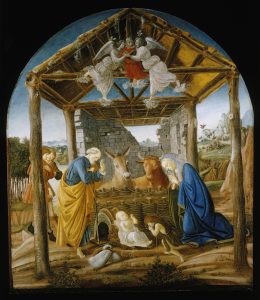Nativity of Our Lord Jesus Christ (December 25)
1 First Mass of Christmas:
[Pope Saint Gregory the Great]
“By God’s generosity, we shall be celebrating three Masses today, and so we cannot speak at length on the Gospel reading. But the Birthday of our Redeemer demands that we say something, however briefly. Why is it that when our Lord was to be born a world-census was taken, if not to show clearly that He who would enroll His chosen ones in eternity was appearing in the flesh? To this enrollment the Psalmist bears witness by way of contrast, when He says of the reprobate, “May they be erased from the Book of the Living, and not be recorded with the just.” It is fitting too that the Savior be born in Bethlehem. Bethlehem means “House of Bread”; and He is the One who says, “I am the Living Bread that has come down from Heaven.” And so the place where Our Lord would be born was already called “House of Bread”. This it was certainly destined to be; for He who was to provide abundant inward refreshment for the souls of His chosen ones would appear there in the flesh. Further, He would be born not in His parental home, but in the course of a journey. By this it was made obvious that in taking a human nature He was, as it were, being born in a land which was foreign.
2 Second Mass of Christmas:
[Saint Ambrose, Doctor and Bishop]
Consider the beginnings of the nascent Church. Christ is born; and the shepherds have begun their vigil. They round up the flocks of the nations, – nations that formerly lived like cattle. They gather them into the Lord’s enclosure, lest these flocks suffer the assaults of spiritual wild beasts lurking concealed in the night’s darkness. And the shepherds keep good watch, having received their formation from the Good Shepherd. The flock, then, is the people; the night is the world; the shepherds, Bishops. Perhaps, too, he could be a shepherd to whom it is said (in the Apocalypse): “Be watchful and strengthen….” For the Lord has not only disposed that Bishops watch over the flock, but has also given His Angels charge over it.
3 Third Mass of Christmas:
[Saint Augustine, Doctor and Bishop]
You are so used to hearing human words that you may tend to think of any “word” as something commonplace. Listen, then, to what you are to think when you hear, “The Word was God.” Some Arian heretic may now come forth and claim that the Word of God was made. But how is it possible that the Word of God was made, when it was through the Word that God made all things? Even if the Word of God Itself was made, through what other word was It made? If you posit a “word of the Word” through which the Word of God is supposed to have been made, then I would say that THAT word is the only Son of God. But if you do not posit a “word of the Word”, then grant that the Word through which all things were made was not Itself made. For the Word through which all things were made could not have been made through Itself. Put Faith, then, in the Evangelist.